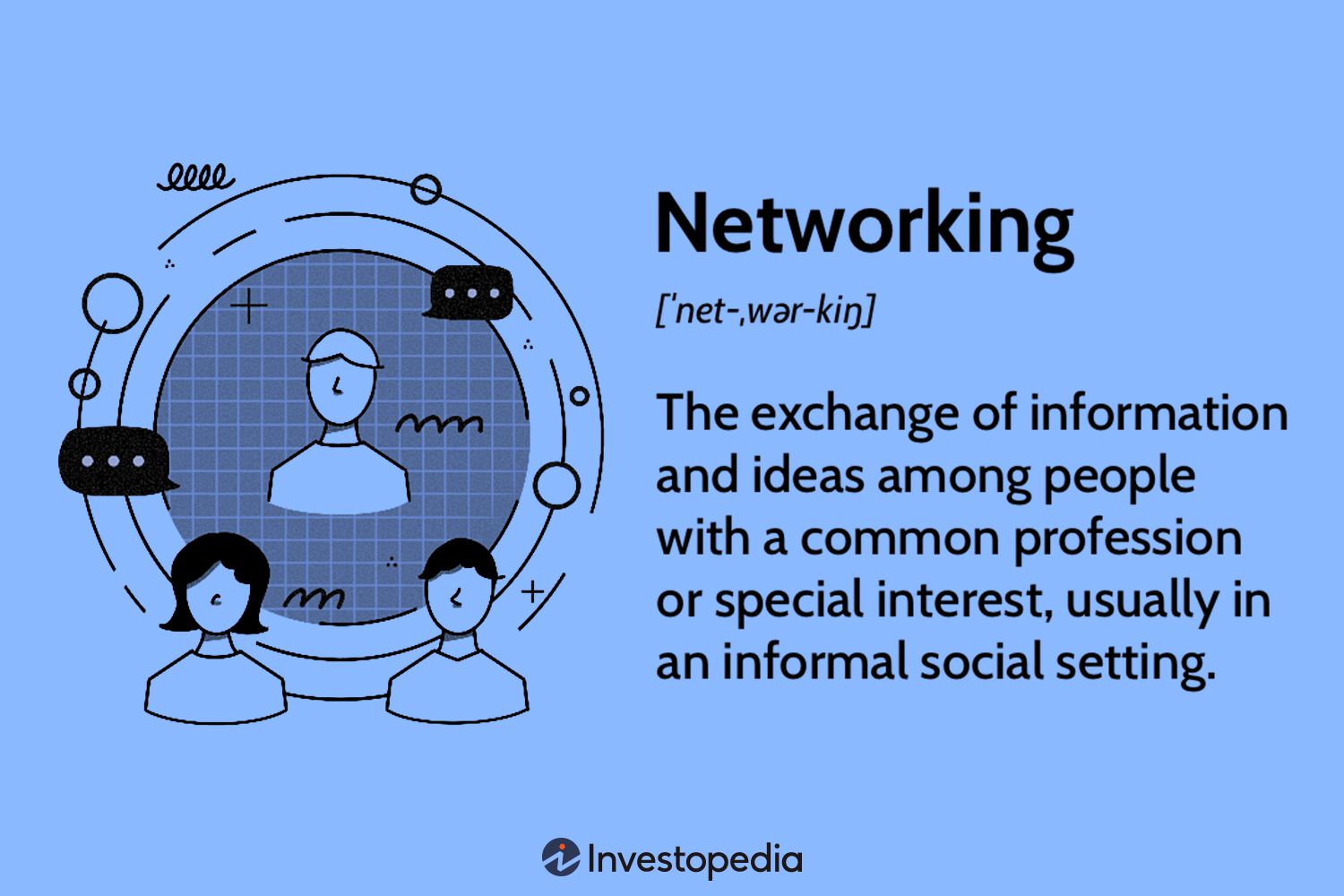Are you curious about how to grow your professional network? Look no further than informational interviews! These meetings provide invaluable opportunities to connect with industry professionals, delve into their expertise, and build lasting relationships. By asking thoughtful questions and actively listening, you can gain valuable insights, expand your network, and open doors for future career prospects. Let’s explore how to make the most out of informational interviews and enhance your networking efforts.

Why use informational interviews?
Informational interviews are a valuable tool for expanding your network, gaining valuable insights, and exploring career options. By conducting informational interviews, you have the opportunity to connect with professionals in your field of interest, learn from their experiences, and gain a deeper understanding of different career paths. Whether you are a recent graduate, considering a career change, or just looking to broaden your professional horizons, informational interviews can provide you with valuable connections and knowledge.
Building connections
One of the main benefits of conducting informational interviews is the opportunity to build connections with professionals in your desired industry. These interviews allow you to establish relationships with individuals who may be able to provide guidance, advice, or even job opportunities in the future. Networking is a critical aspect of career growth, and informational interviews provide a structured and purposeful way to make those connections.
Gaining valuable insights
Informational interviews offer a unique opportunity to gain insights and knowledge from professionals who have already navigated their chosen career paths. By engaging in conversations with industry experts, you can learn about the challenges, opportunities, and trends in your desired field. These insights can help you make more informed decisions about your own career journey, and provide you with valuable guidance and advice.
Exploring career options
If you are unsure about which career path to pursue, informational interviews can be an excellent way to explore your options. Speaking with professionals from various industries and roles can broaden your understanding of different career paths, giving you a clearer picture of what each entails. This firsthand knowledge can help you make more informed decisions about your own career choices, and may even uncover opportunities that you had not previously considered.
Preparing for informational interviews
Before conducting informational interviews, it is important to be prepared. Taking the time to properly identify potential interviewees, research their backgrounds, and prepare thoughtful questions can greatly enhance the effectiveness of your interviews.
Identifying potential interviewees
Start by identifying professionals who work in your desired industry or field. This can be done through online searches, professional networking platforms, or even by reaching out to your university’s alumni network. Look for individuals who have experience or knowledge that aligns with your career interests.
Researching the interviewee
Once you have identified potential interviewees, take the time to research their backgrounds. Look for information such as their current role, previous experience, education, and any notable achievements or projects. This will not only help you personalize your questions, but also demonstrate your genuine interest and preparation during the interview.
Preparing interview questions
Prepare a list of thoughtful and relevant questions to ask during the interview. These questions should focus on gathering insights, advice, and knowledge from the interviewee. Consider asking about their career journey, their experiences in the industry, challenges they have faced, and any advice they have for someone starting out in the field. Remember to keep the conversation focused and respectful of the interviewee’s time.

Setting up informational interviews
Once you have done your research and prepared your questions, it’s time to reach out to the interviewee, schedule the interview, and determine the format that works best for both parties.
Reaching out to the interviewee
Send a professional and personalized email to the interviewee, introducing yourself and explaining the purpose of your request. Clearly articulate why you are interested in speaking with them specifically and express your gratitude for their time and willingness to share their insights. Personalizing your outreach shows that you have taken the time to research and genuinely appreciate their expertise.
Scheduling the interview
After receiving a positive response from the interviewee, work together to find a mutually convenient time for the interview. Be flexible and respectful of their schedule, and offer suggestions for possible meeting formats such as phone calls, video conferences, or even in-person meetings if feasible. Confirm the date, time, and preferred method of communication to ensure a smooth and successful interview experience.
Choosing the interview format
Consider the preferences and availability of the interviewee when choosing the format for your informational interview. Phone calls and video conferences are commonly used for remote interviews, while in-person meetings can provide a more personal and interactive experience. Choose the format that works best for both parties and ensures effective communication and engagement during the interview.
Conducting the informational interview
During the actual informational interview, it is important to establish rapport, ask thoughtful questions, and actively listen to the interviewee’s responses. These actions will not only make the interviewee feel valued and respected, but also allow you to make the most of the opportunity.
Establishing rapport
Begin the informational interview by establishing rapport with the interviewee. Start with a warm and friendly introduction, expressing your gratitude for their time and expertise. Share a bit about yourself and your career aspirations to create a sense of connection. Building this rapport will help create a comfortable and open environment for the interview.
Asking thoughtful questions
During the interview, ask thoughtful and well-prepared questions that delve into the interviewee’s experiences, insights, and advice. Avoid asking generic or surface-level questions that can be easily found through basic research. Instead, aim to ask questions that allow the interviewee to share their unique perspectives and experiences. This will help you gain valuable insights and make the interview more engaging and productive.
Active listening
While conducting the informational interview, practice active listening. Give your full attention to the interviewee, focus on their responses, and show genuine interest in what they have to say. Take notes if necessary to capture important points and demonstrate your attentiveness. Active listening not only shows respect for the interviewee, but also allows you to fully absorb and learn from their insights.

Building your professional brand
Throughout the interview, it is important to present yourself in a professional and courteous manner, while also showcasing your knowledge and enthusiasm for the field.
Being professional and courteous
Maintain a professional and respectful demeanor throughout the entire interview. Use appropriate language and tone, and avoid interrupting or dominating the conversation. Displaying proper etiquette and courtesy will leave a positive impression on the interviewee and enhance your professional reputation.
Demonstrating your knowledge and expertise
Take advantage of the informational interview to showcase your knowledge and expertise in the field. Share relevant experiences, projects, or coursework that demonstrate your understanding of the industry. When appropriate, ask informed follow-up questions or provide insights of your own. This will not only impress the interviewee, but also position you as a knowledgeable and enthusiastic candidate.
Displaying enthusiasm and passion
Express your enthusiasm and passion for the industry throughout the interview. Let your genuine interest shine through by asking engaging questions, actively participating in the conversation, and expressing your gratitude for the interviewee’s time and insights. Demonstrating your enthusiasm can leave a lasting impression and potentially lead to further opportunities or connections.
Expanding your network
Informational interviews are not just a one-time interaction, but an opportunity to expand your professional network. Here are some strategies to help you continue to grow your network beyond the initial interview.
Requesting referrals and introductions
At the end of the informational interview, if the conversation went well, don’t hesitate to ask the interviewee if they can provide any referrals or introductions to other professionals in the field. They may be able to connect you with individuals who can further expand your network or provide additional insights and opportunities.
Using social media to connect
Leverage social media platforms such as LinkedIn to connect with the interviewee and other professionals you have engaged with during your informational interviews. Send personalized connection requests and continue to engage with their content to stay on their radar. Regularly updating your own profile and sharing relevant industry news can also help attract similar-minded professionals to your network.
Attending networking events
Take advantage of local or virtual networking events to meet professionals within your industry. These events provide an opportunity to meet and connect with a variety of individuals, expand your network, and potentially find mentors or future collaborators. Be proactive and approachable during these events, and remember to follow up with the individuals you meet to nurture those connections.

Following up after the informational interview
After the informational interview, it is important to follow up and express your gratitude for the interviewee’s time and insights. This step reinforces your professionalism and helps maintain the connection for potential future interactions.
Sending a thank-you note
Send a personalized thank-you note to the interviewee within a day or two of the interview. Express your gratitude for their time, highlight any specific insights or advice that resonated with you, and reiterate your appreciation for their willingness to share their expertise. A thoughtful and timely thank-you note can leave a positive impression and strengthen the relationship.
Maintaining regular contact
Continue to nurture the relationship by maintaining regular contact with the interviewee. This can be through occasional email updates, sharing relevant articles or resources, or even meeting for coffee or a virtual catch-up. By staying on their radar, you increase the likelihood of future opportunities or referrals.
Offering assistance or support
If you come across any opportunities or resources that may be of interest to the interviewee, be proactive and offer your assistance or support. This could be forwarding job postings, connecting them with relevant contacts, or simply providing moral support. By showing your willingness to help, you reinforce the value of the connection and strengthen the relationship.
Tracking and organizing your network
As you conduct more informational interviews and expand your network, it is important to keep track of your contacts and ensure you have a systematic way of organizing and staying connected with them.
Using a spreadsheet or CRM tool
Create a spreadsheet or use a Customer Relationship Management (CRM) tool to track and organize your network. Include information such as contact details, industry, role, date of contact, and any noteworthy information from the interactions. This will help you stay organized and have a centralized place to refer to when reaching out or following up with contacts.
Categorizing contacts
In addition to a spreadsheet or CRM tool, consider categorizing your contacts based on their relevance or importance to your career goals. For example, you could have categories such as mentors, industry experts, potential employers, or colleagues. This categorization will allow you to prioritize your interactions and focus on nurturing relationships that are most beneficial to your career growth.
Setting reminders for follow-ups
To ensure you maintain regular contact with your network, set reminders or calendar alerts for follow-ups with your contacts. Regularly reach out to individuals in your network to check in, share relevant updates, or offer support. This consistent communication helps foster stronger connections and keeps you engaged with your network.

Learning from informational interviews
Informational interviews offer not only a chance to gather insights and knowledge, but also an opportunity for personal growth and development. Here are some strategies to make the most of the information learned during these interviews.
Analyzing insights and feedback
After conducting informational interviews, take the time to reflect on the insights and feedback you received. Identify common themes, trends, or recommendations that may arise from multiple interviews. Analyzing this information can help you gain a broader understanding of the industry, identify potential gaps in your skills or knowledge, and recognize opportunities for growth.
Applying new knowledge and advice
The knowledge and advice gained from informational interviews can be directly applied to your career journey. Determine how you can incorporate the insights and recommendations into your own professional development plan. This may include seeking out additional training or education, expanding your skill set, or refining your career goals.
Reflecting on your career goals
Informational interviews can also be a time for personal reflection. Take the opportunity to reflect on your own career goals, values, and aspirations. Consider whether the insights gained align with your own aspirations and if any adjustments need to be made. Use the feedback and knowledge gained to further clarify and refine your career goals.
Avoiding common mistakes
While informational interviews can be incredibly beneficial, it is important to avoid common mistakes that can hinder the effectiveness of these interactions.
Being too aggressive or self-centered
When conducting informational interviews, it is crucial to remember that the focus should be on the interviewee, not solely on your own needs. Avoid being too aggressive or self-centered in your questioning and approach. Instead, demonstrate genuine interest in the interviewee’s experiences and perspectives, and make the conversation about their insights rather than your own self-promotion.
Not being prepared or knowledgeable
Lack of preparation can diminish the value of an informational interview. Before the interview, thoroughly research the interviewee and their background, as well as the industry and career field in general. Be prepared with thoughtful and relevant questions that showcase your genuine interest and knowledge. This level of preparation will demonstrate your professionalism and enhance the interview experience.
Forgetting to follow up
Following up is a critical step after conducting an informational interview, yet it is a common mistake to overlook this important action. Forgetting to send a thank-you note or failing to maintain regular contact can leave a negative impression and weaken the potential of the connection. Be sure to follow up promptly after the interview and maintain ongoing communication to nurture the relationship.
In conclusion, informational interviews are a valuable tool for expanding your network, gaining insights, and exploring career options. By properly preparing, conducting the interviews with professionalism and enthusiasm, and following up effectively, you can significantly enhance your professional growth and maximize the benefits of these interactions. So start reaching out to professionals in your desired field today and embark on a journey of personal and professional development through informational interviews.



